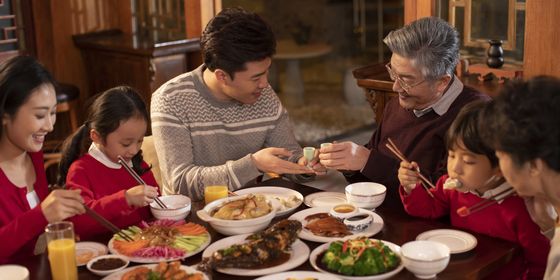Once a sacred family obligation, the annual migration home for Spring Festival increasingly brings feelings of alienation and culture shock for China’s urbanizing population
Renowned writer Yu Kwang-chung (余光中), who fled to Taiwan with the Nationalists via Hong Kong in 1950, once compared his lifelong exile to a “narrow boat ticket”: “I am here, the mainland is there,” he concludes his poem “Homesickness.”
I can sympathize. Like millions of other Chinese on the move, my distance from home has been measured out in tickets ever since I moved away to college. These days, family celebrations, emergencies, and holidays like the Spring Festival mean nine hours on the high-speed rail from Beijing to Qidong county, Hunan (or 16 to 25 hours on the slow train if the gaotie is sold out), an hour and a half on a long-distance coach (probably standing-room only) to the town of Buyunqiao, then a 15-minute motorbike ride to the small village of Guanyin.
It’s a journey of over 1,620 kilometers, and I make it at least once every year at the Spring Festival. Since the late 1970s, when hukou (household registration) reforms first allowed citizens to leave their hometowns to seek work and education, millions have made this ritual migration home, known as chunyun (春运) or “spring transport,” into an annual spectacle. During the 2016 chunyun, according to CNN, hundreds of millions of Chinese traveled 2.9 billion trips by train, boat, and plane, logging a combined distance of 1.2 billion kilometers—the world’s biggest annual human migration, enough for four trips to the Sun and back.
The staple montages of workers laden with bags, stubbornly camped outside train station for tickets, are presented in domestic and international media as heartwarming clichés of persevering family ties. Yet, when I spoke with friends and neighbors working in cities all around China, many felt that geography was the least part of the distance from their hometowns.

The tradition of spending holidays at home makes Spring Festival China’s busiest travel season
My childhood friend, Yan, is one of those who will not return this year. “We may stay in Foshan,” she tells me, referring to the city in Guangdong province where she has worked for four years and obtained a new apartment. “According to our local custom, it’s bad luck for a family to leave their new home empty on the first Spring Festival after they ‘light the fire’”—that is, after they move in.
But this isn’t the only reason. On each of her visits back over the years, Yan’s chief takeaway is that “everyone has moved out,” she observes. “The village is empty.”
In 2015, the number of trips made during chunyun decreased for the first time. Since then, it has remained around 2.9 billion each year—a full 700 million short of the all-time record, 3.6 billion, set in 2014. Most explanations are linked to urbanization: Over 80 percent of Chinese still lived in the countryside at the start of the reform era, but by 2011, over 50 percent were in cities and towns—a stunning turnaround in 33 years. In the last decade, the countryside has lost 160 million of its permanent residents, and continues to lose an estimated 20 million, 3 percent of its total population, each year.
These patterns are a decided triumph for the government, which has identified urbanization as the future engine for GDP growth since the early 1990s (though more recently, there has been a renewed emphasis on developing regional cities and small towns, to reduce overcrowding in first-tier metropolises). It’s also a triumph for our own village. Land reform came to Guanyin in 1980, giving villagers the right to farm their own land for money, but it wasn’t until the 90s that opportunities increased for those with only a primary or middle school education to leave the village.

Construction jobs were among the first to be opened to rural migrants after the reform
By the time I was growing up, my peers were imbibing the lesson of getting into a prestigious university to break free from poverty, which was synonymous with moving to the city. When I return to the village this year, I will be participating in a homecoming of individuals who’ve achieved their own versions of this success story in various far-flung corners of China, while hearing about those, like Yan, whose success may be all the more palpable due to their absence.
With college degrees, white-collar jobs, and (for some) homes in the city, we are fulfilling our parents’ dearest wish of being better off than themselves—parents who’ve had to leave their own children behind with grandparents while toiling at menial jobs in cities, flocking seasonally between the two worlds like migratory birds. Our children will grow up in urban apartments, hopefully with urban hukou, and attend urban schools, writing the next chapter of this story of upward mobility.
And yet as we compare notes this Spring Festival, there will be an unspoken question: Can you truly return to a home that you’ve been urged all your life to leave? Is going back simply a matter of having the right tickets, like Yu Kwang-chung—or are we bound by the same fears as the protagonist in One Way, a novel by French writer Didier van Cauwelaert, “In these busy and anxious times, I’ve just realized that home is a place where I can never return.”
***
On the mountains of my upbringing, farmers once grew rice, peanuts, day-lily plants, sweet potatoes, and other crops typical of southern China. In order to supplement the income from their two to four mu of land—approximately 0.33-0.66 acres, hardly enough to feed a family of four, let alone pay tuition fees—able-bodied adults left to work in developed cities, and the money they sent back was often reinvested into building new homes in the village, where these workers eventually hope to retire.
Yan’s parents took turns “going out” before she got into high school, and her younger brother joined them after finishing vocational school. Now her parents have a pair of furnished two-story houses with modern conveniences in our village. Over the years, other earthen-walled farmhouses from my childhood have been replaced by multi-level constructions of tile and stone, but their grandeur is, literally, empty. “I remember the village being such a lively, human place,” my middle-school classmate Tan Fangli, who grew up in a neighboring village, lamented recently. “Anyone who had good food to eat would bring it out to share. Now, it’s so quiet and cold.”

Children in the village are often raised by grandparents while parents work in the city
Fangli’s parents had also migrated to Foshan to work while she was growing up, and she joined them after middle school. The family has not been back for Spring Festival in over a decade. “Our old house hasn’t been repaired for so long, it’s probably not fit to live in anymore,” Fangli reckons. Across the courtyard from my own home, I have watched a similar fate befall the “new” house of one Uncle Chun, as it slowly crumbled over the last 20 years with its owner yet to spend a single night inside.
Uncle Chun himself was one of the first to leave Guanyin in the 80s. With a middle school education, he has taken on construction and factory work in a variety of cities in the last 36 years, and is currently serving as a manager at a stationery factory in Dongguan, Guangdong. Last year, against the advice of all his family, he began construction of yet another new home to replace the first one in the village, calling it a “long-term” investment. “Even if we could afford the down payment for an apartment in Dongguan, we don’t have an ‘iron rice bowl.’ Any unforeseen accident could cause big trouble,” he says.
Yet the younger generation now wants more, and our desires are increasingly bound up in the context of the city. In contrast to Uncle Chun, my classmate Liu Yanping is sinking all her energy, as well as savings from half a decade’s work in Beijing, into establishing a foothold in the capital against all odds. “I can never live in the village again,” she vowed. “I’ve struggled more than 20 years to make it to Beijing, and to give my child a headstart over the kids in the village.”
Though she is a college-educated employee at one of China’s biggest banks, Liu and her Sichuanese husband still lack the hukou that would entitle them to buy property and send their son to public school in Beijing. For now, they’ve acquired an apartment in the satellite town of Yanjiao, Hebei province, and Liu has been trying for the last three years to pass the exams to obtain a civil service position—the proverbial “iron rice bowl” that Uncle Chun had despaired of ever having—with the Beijing hukou it guarantees. “Now the urban-country education gap has widened even more; I can never move home and have my kids go through that hardship.” Just in case it doesn’t work out, she has obtained a back-up hukou in the nearby city of Tianjin.
Another classmate, Tan Fumin, believes that our peers no longer see making their way in the city as simply a matter of survival, but emotional fulfillment. “Our ideals have changed from being well-fed to being well-off, from making a living to having a life,” he argues. “And once you’ve experienced the thrill of aspiration, you can no longer get used to the serenity of the village.”

“Spring couplets” on the door mean that the family has returned
Even those who haven’t managed to reach the biggest metropolises, like Liu, appear to be searching for the next best thing. While migration in our parents’ generation had created an estimated 61 million “left-behind children” and 50 million “left-behind elderly,” according to the Ministry of Civil Affairs, even these children are becoming scarce these days in the countryside. Pingtang Middle School, one kilometer away from my house, had over 500 students when I studied there 15 years ago; now it has less than 100. My generation prefers sending their children to school in nearby towns or county seats, which are perceived to be of better quality, and they increasingly have the means to make this happen.
While close to 60 percent of China’s population have urbanized as of 2017, China’s two biggest metropolises—Shanghai and Beijing—actually lost population that year. Regional hubs, provincial capitals, and prefectural seats are becoming the main beneficiaries of urbanization; with the exception of Shenzhen and Xiamen, all 90 Chinese cities which posted a population growth of 10 percent or above in 2017 were classified as “prefectural level,” according to the National Statistics Bureau. Smaller cities, and even county-level towns, are already becoming a good compromise for migrants caught between their attraction to city life and the obligations of home. Fangli moved back from Foshan to our nearest town, Buyunqiao, in 2015, after her daughter finished kindergarten, since the family’s lack of a hukou meant that the children could not matriculate into Foshan’s public schools.
It was a move she made under protest. “If it wasn’t for those restrictions, I still would have preferred to be in the city,” she says. Yet small-town life has its advantages, such as cleaner air, better food, and familiar people, including Fangli’s parents, who have bought an apartment in the same town for their eventual retirement. This year, according to tradition, they will spend Spring Festival at the new house for luck, and the whole family will be “home” for the holidays for the first time in 16 years—neither in the village nor the city, but this new place in between.
***
Returning for the holiday, of course, is different from going back permanently. For Yan, who has all but settled in Foshan, a visit means a well-deserved vacation from city life. “In the city, I spend every waking moment working, or else I can’t pay for my mortgage, electricity, and water,” she says. “Going home means putting down burdens, and eating, drinking, and sleeping my fill.”
For Liu, however, a visit is an emotional anticlimax. Each year before the Spring Festival, she says, “I am excited; I yearn for home. Away from home I feel like an exile, and I think that home is the only place where I can be perfectly at ease.” Yet after each visit, “What I feel is bored and frustrated. I realize I’m only passing through, and the sense of belonging I remember is gone.”

The whole family must gather for a meal on New Year’s Eve
She isn’t alone in these feelings. In recent years, Spring Festival has meant a glut of think-pieces on millennials’ supposed fear of the holiday season. Anecdotally, of all the friends and neighbors I spoke to, it was mainly those in their 30s and below who were hesitant to visit or move back. Hyperbolic headlines scream that there may be anywhere from 100,000 to 3 million millennials in China afflicted with “return phobia” (恐归).
No actual studies exist to support those figures, though the main reasons that sufferers cite for their fear sound like typical young people problems—a 2017-2018 study conducted by Taiwanese research firm Daily View found excuses like lack of money to travel and buy gifts for those back home, as well as parental pressure for marriage or career choices and a difference of values from one’s parents and relatives, which lead to awkward or superficial reunions. Indeed, over 50 percent of the return-phobes surveyed by matchmaking site Jiayuan said they were staying in the city during 2017’s Spring Festival in order not to be pressured or set up on blind dates by relatives.
Returning to the village today can bring palpable feelings of culture shock. When I was growing up, we had no neighbors; instead of linju (邻居)—strangers who happen to live in close proximity—our “villages” were known as yuanzi (院子, compound), a collection of homes backing a large courtyard, separated by mountains and fields from other yuanzi in the area. The 100 or so residents whose homes open into the courtyard are all members of one of five clans, and address each other as family according to seniority, from Grandpa Tan down to Sister Tan.
In his 1948 book Earthbound China, renowned anthropologist Fei Xiaotong described Chinese society as “relational”: In an agrarian culture, each person was surrounded by a “network” made up of those of shared kinship or geography, with bonds growing weaker the further one travels from the center. In other words, even if our nearest weren’t necessarily our dearest, we had an obligation to them—to honor their opinion, keep them informed of our choices, and hope that they approve.
For migrants who live most of the year in the anonymity of the city, leading private lives and making their own decisions, it can be difficult to become “Sister Tan” again in this increasingly claustrophobic network—if they even want to do so. “When I only had one home, I was satisfied with the way of life there, and I accepted the people and things there as they were,” reflects Liu. “As a grown-up, I see people [in the village] through different lenses—how ignorant, how narrow-minded they can be.”

Firecrackers are set off at dawn on the first day of the New Year
Cultural gaps aside, the feeling that one’s actual achievements don’t live up to expectations of folks back home may be keeping more migrants away—Daily View found it to be the second most common reason for avoiding Spring Festival. In our village, generally, college education is expected to lead to prosperity, which means working at a state-owned enterprise, multinational corporation, the civil service, or a public school; launching a successful start-up is an acceptable alternative. Since I have done none of the above, I am not a success story, even though I obtained the first college diploma and the only Master’s degree of our yuanzi, to date. “Don’t learn from your older sister Feifei,” I overheard an aunt scolding her primary school-age daughter on a recent visit. “It’s useless to read so many books.”
I’ve made peace with my supposed “failures,” but others have not. In a 2014 survey by Daguu.com, a now-defunct blue-collar recruitment platform, 47 percent of workers who didn’t go home said that they “lacked face” to return due to the meagerness of their earnings. Other self-described failures turn into “disappeared zhuangyuan”—champion scorers of the National College Examination (gaokao), usually of rural origins, who gained admission to a top university but failed to achieve conventional success afterwards, thus choosing to cut off all contact with their families out of shame.
As with the case of these vanished champions, our alienation from village life isn’t necessarily out of choice. Yan still cherishes a dream of retiring to the village, believing that her sojourn in the city is only necessary for survival. “It’s a relief for me to have moved to where my son can enjoy better living conditions and schools…but once he is grown up, I will move back to the village. I still have a plot of land there; I can grow flowers, fruits, and vegetables.”
Liu, though, finds these wishes unrealistic. “I fantasize about returning, yet in reality, I don’t want to,” she states, citing turn-offs like poor-quality healthcare and education, a lack of friends with common interests, and generally harsh conditions. “This is the paradox: There is no place like home—including home, which is no longer the place I recall from my memories.”
***
When I climb off the motorbike in Guanyin this Spring Festival, the first thing I will do is help with spring cleaning to get our family’s year off to a tidy start. For the next few days, we will attend some of the daily market meetings held in town to prepare “new year items” (年货)—gifts for relatives, as well as things we will use and eat during the holiday. The main event takes place on the first day of the Lunar New Year, when each clan gathers at the home of its oldest member to send New Year wishes, then moves on to the next most senior member, and so on, until no one in the yuanzi is left out.
For centuries, these traditions have stayed relatively unchanged, but as I go through these familiar motions each year, I think there has been a seismic shift in what the rituals of homecoming and family bonding mean to this formerly “earthbound” society. Fangli is far less emotional about her family’s “homecoming” than one might expect. “Granted, the holiday celebrations in our village are more festive, but our family has been equally happy in Guangdong,” she says. “To us, home is wherever the family is, and it could be anywhere as long as we’re together.”
Liu agrees, believing that, linguistically, we might want to reexamine how we understand hometowns—or jiaxiang (家乡), which is literally made up of characters for “family” or “home” (家) and “village” (乡). “The concept of ‘home village’ puts emphasis on ‘village,’ which is a nostalgic label for places, people, things, and flavors that you can’t ever get back, so you cherish it excessively,” she argues. “But ‘home,’ to me, simply means my loved ones.”
Thinking of this newer but emptier village, I wonder whether the distance from home increases the more choices we have to return—or the less. It puts me in mind of another quote, written by the Tang poet Song Zhiwen, “The closer I get to home the more nervous I feel; I’m afraid to ask other travelers how things have changed.”
– Edited by Hatty Liu
Home Bound is a story from our issue, “Home Bound.” To read the entire issue, become a subscriber and receive the full magazine.












